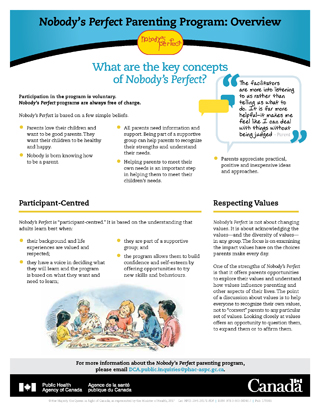What are the key concepts of Nobody's Perfect?

Download the alternative format
(PDF format, 255 KB, 2 pages)
Organization: Public Health Agency of Canada
Type: Fact Sheet
Date published: 2017-11-30
Related Topics
Participation in the program is voluntary. Nobody’s Perfect programs are always free of charge.
Nobody’s Perfect is based on a few simple beliefs.
- Parents love their children and want to be good parents. They want their children to be healthy and happy.
- Nobody is born knowing how to be a parent.
- All parents need information and support. Being part of a supportive group can help parents to recognize their strengths and understand their needs.
- Helping parents to meet their own needs is an important step in helping them to meet their children’s needs.
- Parents appreciate practical, positive and inexpensive ideas and approaches.
“The facilitators are more into listening to us rather than telling us what to do. It is far more helpful - it makes me feel like I can deal with things without being judged”
- Parent
Participant-centred
Nobody’s Perfect is “participant-centred.” It is based on the understanding that adults learn best when:
- their background and life experiences are valued and respected;
- they have a voice in deciding what they will learn and the program is based on what they want and need to learn;
- they are part of a supportive group; and
- the program allows them to build confidence and self-esteem by offering opportunities to try new skills and behaviours.
Respecting values
Nobody’s Perfect is not about changing values. It is about acknowledging the values—and the diversity of values—in any group. The focus is on examining the impact values have on the choices parents make every day.
One of the strengths of Nobody’s Perfect is that it offers parents opportunities to explore their values and understand how values influence parenting and other aspects of their lives. The point of a discussion about values is to help everyone to recognize their own values, not to “convert” parents to any particular set of values. Looking closely at values offers an opportunity to question them, to expand them or to affirm them.
Experiential learning
Nobody’s Perfect is based on the concept of “experiential learning”. This means that Nobody’s Perfect facilitators do not tell parents what they should do or how they should do it. This program offers experiences through which parents gain information and insight and apply what they have learned to many areas of their lives.
The process of experiential learning involves recognizing and examining experiences by asking (and answering) a series of questions: What? So what? and Now what?
“Adult education really works! It was exciting to see things brought out and comments made and to see changes parents could see happening to themselves. Instead of me giving all the information it came from the parents – they took over.”
– Nobody’s Perfect Facilitator
Flexibility
Nobody’s Perfect is designed to be flexible and can be tailored to meet the needs of both parents and organizations that offer the program. While there are program materials for parents, there is no set curriculum. The content of each session is based on the needs of the group.
Nobody’s Perfect is usually offered as a series of group sessions held over a period of six to eight weeks. Each session is about two hours long. The series can be expanded to cover a longer period (for example, 10 to 12 weeks) and can have longer sessions (for example, three hours each). It can also be offered in a compressed form, as day-long sessions held over one or several weekends. Nobody’s Perfect can also be used one-on-one with individual parents.
Nobody’s Perfect is flexible enough to allow organizations to define their own participants within the range of parents for whom the program has been designed. For example, an organization may choose to define “young” as parents who are 25 years of age or younger. Another organization may define “young” as 15 years or younger. Some organizations may concentrate on reaching single mothers or fathers. Others may focus on mothers in conflict with the law, parents new to Canada or Indigenous parents.
The program has been offered in a broad range of settings and used by many different kinds of parents, including immigrant/refugee, Indigenous and parents of all ages. The program is also offered in other countries such as Japan, Chile and Mexico.
For more information about the Nobody’s Perfect parenting program, please email DCA.public.inquiries@phac-aspc.gc.ca.